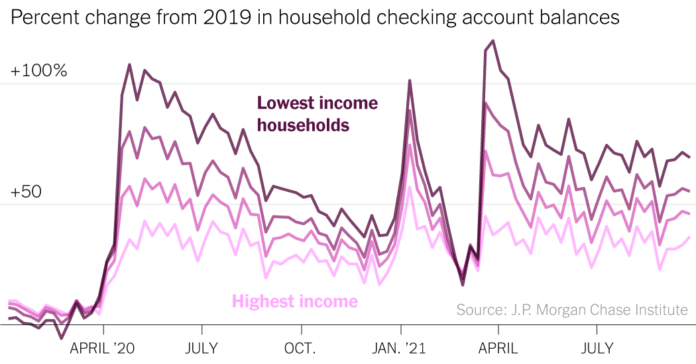In a commentary published on a Federal Reserve Bank of New York blog in April, four economists argued that “although large by historical standards, the savings accumulated by U.S. households during the pandemic do not appear to be ‘excessive’ when set against the extraordinary need of many American families.”
Millions of Americans could be buffeted by financial volatility again with little safeguard as new variants of the virus emerge. For some, that reality has already begun.
“It was hard even before the pandemic hit,” said Maria Patton, a 57-year-old former real estate agent whose finances were ruined by a recent divorce. “And when the pandemic hit, it became impossible, almost.”
Ms. Patton, who has a teenage son, had just been hired at Nordstrom in Los Angeles when the virus surged and she was laid off. Despite immediately applying for unemployment insurance in March 2020, she went more than two months without receiving benefits. She tried to find work as a nanny — which had been her most recent employment — but wound up moving home to Tennessee, where she figured the cost of living was more affordable.
As she was moving in the middle of last year, she received back payments for all the weeks she was eligible for Pandemic Unemployment Assistance — an emergency federal program to help freelancers and others who do not ordinarily qualify for state benefits — which amounted to a lump sum of $15,000. Much of that cash, Ms. Patton says, went to paying down debt, as well as “paying for medical insurance out of my pocket” because she can’t afford health care coverage, and living in a hotel because landlords in Nashville didn’t like her credit situation.
Ms. Patton used more of her savings in January to move the two of them to Denver for a $25-an-hour nanny job she found online, which went well until she got Covid-19 and had to quit. Now she and her son work for Amazon Fresh, the grocery delivery service, making $15 an hour. Her savings dried up in September.
“Now, I’m right back where I was,” she said. “I feel like a loser. I feel like a failure.” Making too much to qualify for assistance but too little to afford stable housing, she fears she and her son will be living out of her car soon after the holidays.
Credit: Source link








